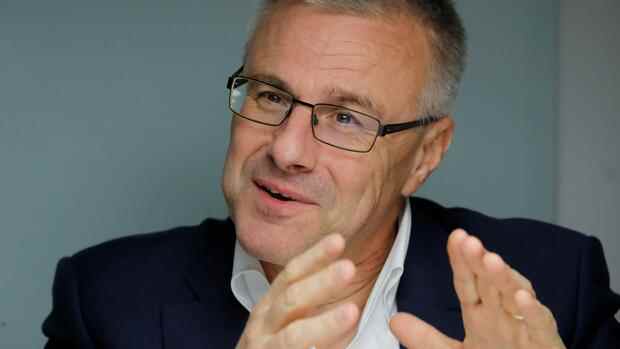The head of the personnel service provider has insight into the mental life of companies worldwide.
(Photo: Reuters)
Dusseldorf “Reconnecting” – that’s what Alain Dehaze, 59, calls his current agenda. After almost two years of the pandemic, the CEO of the world’s leading personnel service provider Adecco finally wants to meet employees and customers in person again. Germany, Brazil and Mexico are the travel destinations of the manager who has headed the Swiss group since 2015.
Dehaze can only advise other CEOs to “reconnect”. “The time is ripe for companies to rebuild their bond with their employees as quickly as possible,” he said in an interview with the Handelsblatt. From his point of view, lockdown and permanent home office have led to breaks in many companies – and to heavy burdens for managers and employees.
Dehaze is himself the boss of 34,000 people who work for the personnel service provider. In his job, the native Belgian also gets a deep insight into the current inner life of other companies and has this regularly examined in surveys. “We can clearly see that a great many have suffered from the working conditions during the pandemic,” summarizes the Adecco boss.
From his point of view, the long-term consequences for the employees are not yet foreseeable. But Dehaze fears: “Burnout threatens to become the next pandemic.”
Top jobs of the day
Find the best jobs now and
be notified by email.
One thing is clear to him: After two years of the corona pandemic, it is very tiring for employees to still only work from home. Dehaze observes that productivity has not deteriorated from working at home or at the kitchen table. For many, however, the burden and stress would have increased.
“Several factors come together: digitization and automation of work are increasing rapidly, there are also stressful situations with the family in the home office,” says the Adecco boss. In addition, there is the loneliness that not only employees experience. “Thousands of students have started their studies without much personal contact to fellow students and the university. That is a great pity for this generation.”
Many experts expect problematic consequences from the stresses in the pandemic world. In the United States, burnout among white-collar workers is at an all-time high, according to the American Association of Psychologists. In this survey, three out of five employees report declining motivation and energy in their job.
Emotional intelligence was lacking
For the Adecco boss, this is also a consequence of leadership deficiencies in companies. “Most leaders have not dealt well with the mental strain of remote workers,” he said. “That is also understandable, because they were not used to it and lacked the emotional intelligence that is important in this situation.” The younger managers in particular were completely unprepared.
On the other hand, employees in all companies have also learned to appreciate the advantages of “working from home”. Adecco itself surveyed 15,000 people worldwide: the flexibility they have gained in their day-to-day work, no longer having to commute – the employees no longer want to let that go.
From the Adecco boss’s point of view, there will be no return to the old working model with a 9 a.m. to 5 p.m. job in the office. But he doesn’t think 100 percent home office makes sense or is advisable for the employees or for the company: “People need contact, proximity, they need to be encouraged.”
At Adecco, the boss has a clear idea of how reconnecting works. Dehaze attaches great importance to the fact that the employees of the personnel service provider spend at least two days a week in the office, work there on projects, exchange ideas and are supported.
This is the only way to develop a common culture with newly hired colleagues. “I am convinced that creativity and the search for innovations are much stronger when people come together in person and not just in video conferences.”
Dehaze observes that a 50/50 rule is now being established in many companies: only half of the working hours should be spent at the desk at home. Such a division is also challenging enough for managers: “In a post-Covid corporate culture, trust among one another must and will play a much greater role than it used to,” says Dehaze. “It’s not easy to do. If there was little trust in a company even before Covid, it is catastrophic for the next phase.”
More: Minister of Labor Heil promises a legal right to work from home – and receives an objection
